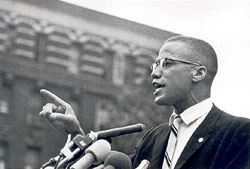Archival Footage

WATCH
A free version of Realplayer is required to view all multimedia elements on this site.
Mike Wallace introduces segment of "The Hate that Hate Produced," showing Malcolm X addressing non-Muslim audience in Harlem on African Freedom Day. 1959.
Louis Lomax interviews Malcolm X. From "The Hate that hate Produced", 1959.
Louis Lomax interviews Elijah Muhammad. From "The Hate that Hate Produced", 1959.
Footage of Elijah Muhammad speaking at U-Line Arena in Washington, DC. 1959.
Malcolm X speaks to a reporter about the need for the Black man to become independent of whites. May 10, 1961.
Malcolm X at a Harlem Square rally speaks about the Ronald Stokes incident in Los Angeles. July 21, 1962.
"Race Relations in Crisis 1963-1992" With Wyatt Tee Walker (Chief of Staff, Southern Leader Conf, exec. assist to MLK), James Farmer (National Director, CORE), Alan Morrison (NY editor, Ebony), and Malcolm X. Richard D. Heffner, Dowling Porfessor of Communications and Public Policy Rutgers University, moderates. June 12, 1963.
Malcolm X is interviewed by Herman Blake as part of a Lecture #22, Sociology 1-A, University of California. In this section, Malcolm X comments on the relationship between the emergence of African nations and the appeal of Elijah Muhammad's teachings. October 11, 1963.
Malcolm X is interviewed by Herman Blake as part of a Lecture #22, Sociology 1-A, University of California. In this section, Malcolm X explains why he favors separation. October 11, 1963.
John Ali reads Elijah Muhammad's statement disavowing Malcolm X's statement about the death of JFK, and announces that Malcolm X is prohibited from public speaking. December 4, 1963.
In a brief news interview, Malcolm X speaks about Black Nationalism, economic independence, and Black/white relations. March 12, 1964.
Malcolm X speaking at the Audubon Ballroom in Harlem comments on slavery and what it means for African American identity. March 29, 1964.
Malcolm X speaking at the Audubon Ballroom in Harlem comments on how African Americans should look to the new African states at the United Nations, as an example of the power of the vote. March 29, 1964.
Malcolm X speaking at the Audubon Ballroom in Harlem comments on the Civil Rights bill and supporting a voter registration drive in Harlem. March 29, 1964.
In this clip from the British television series, "World in Action," Malcolm X speaks on the white, European view of history. 1964, London, UK.
News footage of Malcolm X's press conference on his return from Mecca. He comments on the acceptance of all races in Islam, and how his views have and have not changed. May 21, 1964.
In a brief interview with Mike Wallace, Malcolm X comments on his relationship with the Nation of Islam and the threats to his life. June 8, 1964.
Malcolm X speaks with reporters after testifying at his eviction trial at the Queens County Civil Court. June 15, 1964.
Malcom X is interviewed in Cairo during his visit to the African Summit Conference. July 17, 1964.
Elijah Muhammad comments on his split with Malcolm X (c.1965, before the assassination).
Malcolm X describes the the firebombing of his home at an Organization of Afro-American Unity rally at the Audubon Ballroom in Harlem. Feb. 15, 1965.
Footage in the aftermath of the firebombing of Malcolm's home, including an interview with Betty Shabazz about the incident. February 14, 1965.
Martin Luther King Jr. comments on death of Malcolm X. February, 1965.
Footage taken in the aftermath of the assassination
Betty Shabazz speaks two days after Malcolm X's death about his view on rights for African Americans. February 23, 1965.
Film of Saviour's Day in Chicago, a few days after Malcolm X's death. Elijah Muhammad denounces Malcolm X as a traitor. February 28, 1965.
NOTE: If you or your organization own the copyright to any of the material above, please notify the webmaster to have it removed from this site.







